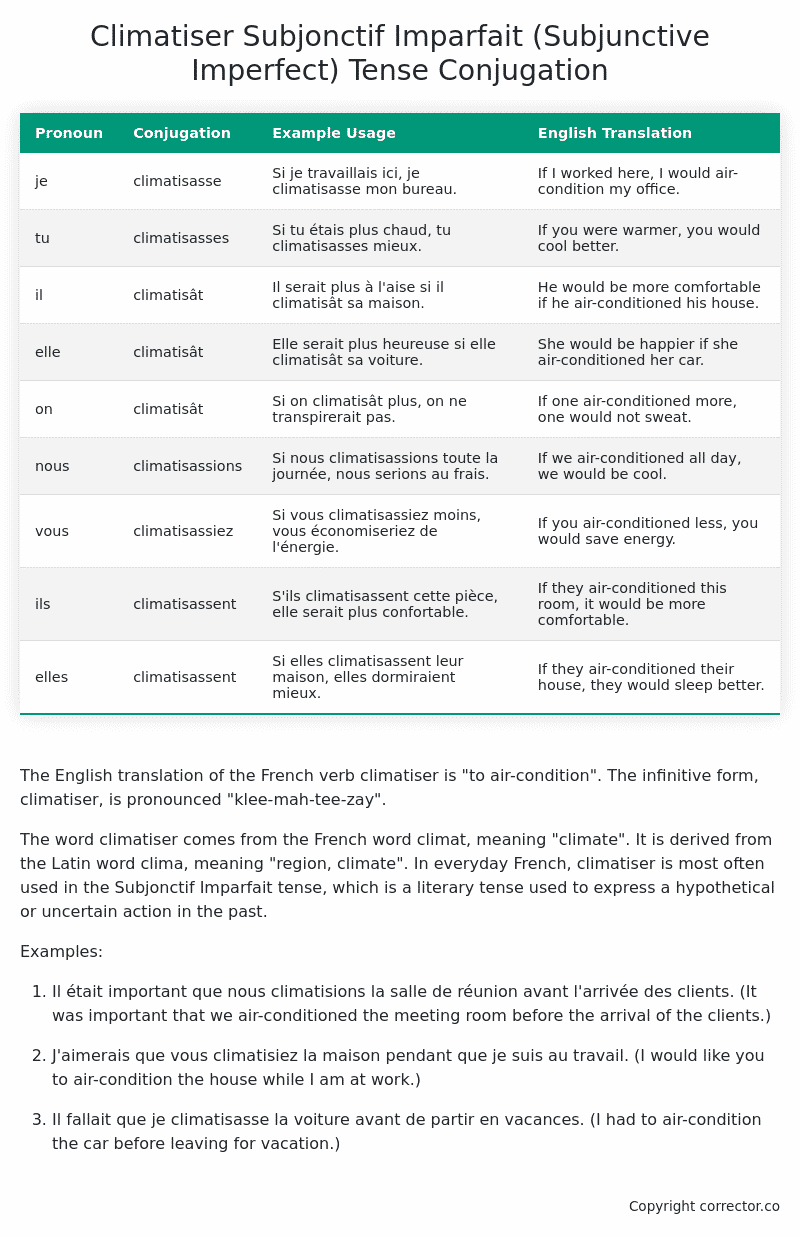Subjonctif Imparfait (Subjunctive Imperfect) Tense Conjugation of the French Verb climatiser
Introduction to the verb climatiser
The English translation of the French verb climatiser is “to air-condition”. The infinitive form, climatiser, is pronounced “klee-mah-tee-zay”.
The word climatiser comes from the French word climat, meaning “climate”. It is derived from the Latin word clima, meaning “region, climate”. In everyday French, climatiser is most often used in the Subjonctif Imparfait tense, which is a literary tense used to express a hypothetical or uncertain action in the past.
Examples:
-
Il était important que nous climatisions la salle de réunion avant l’arrivée des clients. (It was important that we air-conditioned the meeting room before the arrival of the clients.)
-
J’aimerais que vous climatisiez la maison pendant que je suis au travail. (I would like you to air-condition the house while I am at work.)
-
Il fallait que je climatisasse la voiture avant de partir en vacances. (I had to air-condition the car before leaving for vacation.)
Table of the Subjonctif Imparfait (Subjunctive Imperfect) Tense Conjugation of climatiser
| Pronoun | Conjugation | Example Usage | English Translation |
|---|---|---|---|
| je | climatisasse | Si je travaillais ici, je climatisasse mon bureau. | If I worked here, I would air-condition my office. |
| tu | climatisasses | Si tu étais plus chaud, tu climatisasses mieux. | If you were warmer, you would cool better. |
| il | climatisât | Il serait plus à l’aise si il climatisât sa maison. | He would be more comfortable if he air-conditioned his house. |
| elle | climatisât | Elle serait plus heureuse si elle climatisât sa voiture. | She would be happier if she air-conditioned her car. |
| on | climatisât | Si on climatisât plus, on ne transpirerait pas. | If one air-conditioned more, one would not sweat. |
| nous | climatisassions | Si nous climatisassions toute la journée, nous serions au frais. | If we air-conditioned all day, we would be cool. |
| vous | climatisassiez | Si vous climatisassiez moins, vous économiseriez de l’énergie. | If you air-conditioned less, you would save energy. |
| ils | climatisassent | S’ils climatisassent cette pièce, elle serait plus confortable. | If they air-conditioned this room, it would be more comfortable. |
| elles | climatisassent | Si elles climatisassent leur maison, elles dormiraient mieux. | If they air-conditioned their house, they would sleep better. |
Other Conjugations for Climatiser.
Le Present (Present Tense) Conjugation of the French Verb climatiser
Imparfait (Imperfect) Tense Conjugation of the French Verb climatiser
Passé Simple (Simple Past) Tense Conjugation of the French Verb climatiser
Passé Composé (Present Perfect) Tense Conjugation of the French Verb climatiser
Futur Simple (Simple Future) Tense Conjugation of the French Verb climatiser
Futur Proche (Near Future) Tense Conjugation of the French Verb climatiser
Plus-que-parfait (Pluperfect) Tense Conjugation of the French Verb climatiser
Passé Antérieur (Past Anterior) Tense Conjugation of the French Verb climatiser
Futur Antérieur (Future Anterior) Tense Conjugation of the French Verb climatiser
Subjonctif Présent (Subjunctive Present) Tense Conjugation of the French Verb climatiser
Subjonctif Passé (Subjunctive Past) Tense Conjugation of the French Verb climatiser
Subjonctif Imparfait (Subjunctive Imperfect) Tense Conjugation of the French Verb climatiser (this article)
Subjonctif Plus-que-parfait (Subjunctive Pluperfect) Tense Conjugation of the French Verb climatiser
Conditionnel Présent (Conditional Present) Tense Conjugation of the French Verb climatiser
Conditionnel Passé (Conditional Past) Tense Conjugation of the French Verb climatiser
L’impératif Présent (Imperative Present) Tense Conjugation of the French Verb climatiser
L’infinitif Présent (Infinitive Present) Tense Conjugation of the French Verb climatiser
Struggling with French verbs or the language in general? Why not use our free French Grammar Checker – no registration required!
Get a FREE Download Study Sheet of this Conjugation 🔥
Simply right click the image below, click “save image” and get your free reference for the climatiser Subjonctif Imparfait tense conjugation!

Climatiser – About the French Subjonctif Imparfait (Subjunctive Imperfect) Tense
Formation
Common Everyday Usage Patterns
Interactions with Other Tenses
Subjonctif Présent
Indicatif Passé Composé
Conditional
Conditional Perfect
Summary
I hope you enjoyed this article on the verb climatiser. Still in a learning mood? Check out another TOTALLY random French verb conjugation!


